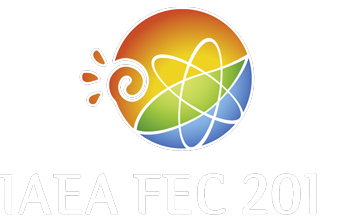Speaker
Prof.
Yoshitaka Mori
(The Graduate School for the Creation of New Photonics Industries)
Description
Fast heating is a scheme to heat an imploded high density plasma into a hot state before the plasma hydro dynamically expands and dissolves. For a heating process driven by laser induced hot electron currents, the energy of hot electrons beyond MeV having a range of a few g/cm^2, therefore collisional coupling is inefficient until the core density reaches hundreds g/cc. To improve the MeV electrons’ coupling, an energy deposition via the anomalous resistivity in strong magnetic filaments induced by the electromagnetic tow-stream instability, so called Weibel instability was expected. However, this Weibel instability was found to be suppressed in the collisional dense plasma, namely, the heating by the fast electrons stays inefficient. In contrast, counter irradiating fast heating scheme we propose here can improve this insufficient coupling efficiency by introducing a magnetic field supposed to be contributing to trap hot electrons in the core. We report fast heating of a shock-imploded core under counter beam irradiation by using a repetitive IFE driver HAMA. Experimental results show that (i) a shock-imploded core with 70 micron diameter, originally deuterated polystyrene (CD) spherical shell of 500 micron diameter, is flashed by counter irradiating 110 fs, 7 TW laser pulses. The coupling efficiency from the laser to the core emission was inferred 13%. A collisional particle-in-cell (PIC) simulation indicates a possibility that counter hot electron currents generate magnetic filaments in the imploded core. (ii) Fast electrons with energy bellow a few MeV might be trapped by these filaments in the core region supposed to be contributing to the observed X-ray flash and the high coupling efficiency. These results indicate a possibility that counter irradiating fast heating scheme can improve the energy coupling into the core by hot electrons those are limited to less 10% for one-side irradiation fast heating conducted so far.
| Country or International Organization | Japan |
|---|---|
| Paper Number | IFE/P5-9 |
Author
Prof.
Yoshitaka Mori
(The Graduate School for the Creation of New Photonics Industries)
Co-authors
Dr
Atsushi Sunahara
(Institute for Laser Technology)
Dr
Eisuke Miura
(AIST)
Dr
Hirofumi Kan
(Hamamtsu Photonics, K. K.)
Dr
Hirozumi Azuma
(Aichi SR)
Prof.
Katsuhiro Ishii
(GPI)
Mr
Nakahiro Sato
(Hamamatsu Photonics, K. K.)
Dr
Osamu Komeda
(Toyota Technical Development Corp.)
Prof.
Ryohei Hanayama
(The Graduate School for the Creation of New Photonics Industries)
Mr
Suisei Nakayama
(GPI)
Dr
Takashi Kurita
(Hamamatsu Photonics, K. K.)
Mr
Takashi Sekine
(Hamamatsu Photonics K.K.)
Dr
Tatsumi Hioki
(GREMO, Nagoyga Univ.)
Mr
Teppei Nishi
(TOYOTA Central Research and Development Laboratories, Inc.)
Prof.
Tomoyoshi Motohiro
(GREMO, Nagoyga Univ,)
Dr
Toshiyuki Kawashima
(Hamamatsu Photonics, K. K.)
Mr
Yasuhiko NISHIMURA
(The Graduate School for the Creation of New Photonics Industries, Toyota Technical Development Corporation)
Prof.
Yasuhiko Sentoku
(Univ of Nevada, Reno)
Prof.
Yoneyoshi Kitagawa
(The Graduate School for the Creation of New Photonics Industries)

